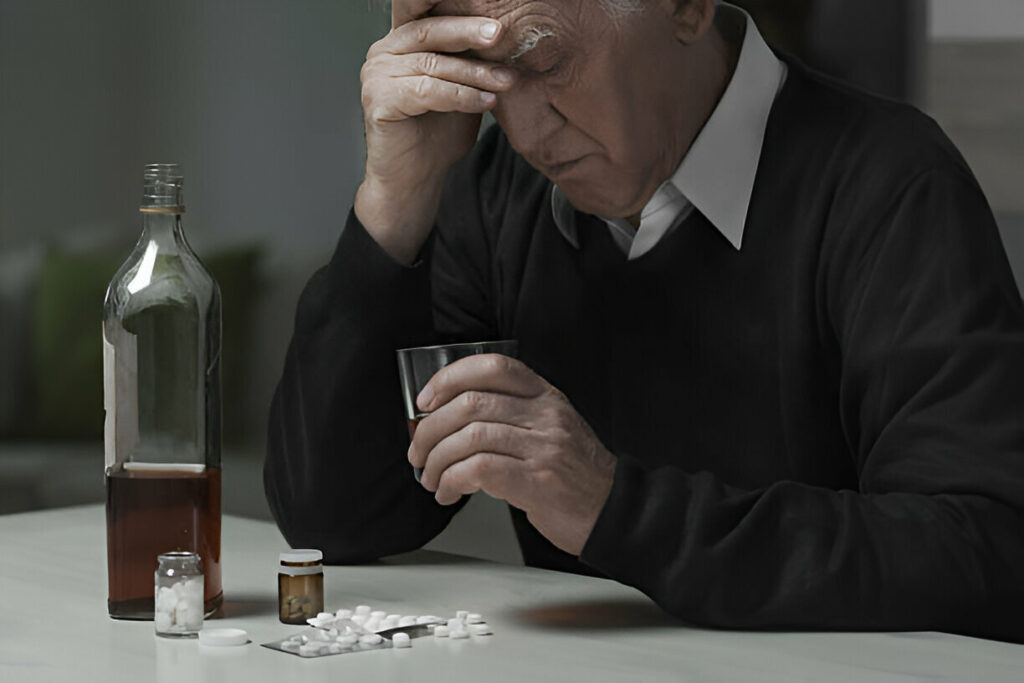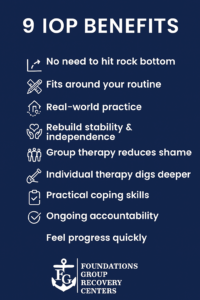There’s a specific exhaustion that comes with keeping your life together while quietly unraveling inside. If you’ve been managing a career, relationships, and responsibilities while drinking more than you’d like to admit—you’re not alone. I see it every week.
The truth? High-functioning doesn’t mean “healthy functioning.” It just means you’ve mastered the art of pushing through, even when things feel off. But you’ve landed here, which tells me you’ve probably had enough. Enough of the internal hangover, the broken promises to yourself, the mornings where you swear this time will be different.
At Foundations Group Recovery Center in Mashpee, MA, I work with people who finally decide they don’t want to crash before they course-correct. They choose something that works with their life instead of shutting it down completely. That’s where the intensive outpatient program (IOP) comes in. This guide breaks down what to expect, why it’s effective, and how you can keep building a healthier life after it.
What Is an Intensive Outpatient Program and What Can You Expect?
An Intensive Outpatient Program in Massachusetts is exactly what it sounds like—intensive, but outpatient. You show up several times a week for structured therapy, then go home to your life.
At Foundations Group, IOP typically runs 3 to 5 days a week, usually 3 to 4 hours per session. It’s designed to deliver solid therapeutic support without requiring you to leave your job, home, or family. You keep living your life, but you stop living it stuck in unhealthy cycles.
In an IOP, you’ll attend:
- Group Therapy, where you learn from others, practice vulnerability, and realize you’re not the only person battling a hidden drinking problem.
- Individual Counseling, where you dive into your personal patterns, triggers, and root causes of your drinking.
- Skills Groups, where you actually practice coping tools, emotional regulation techniques, and real-world strategies for sobriety.
- Medical and Psychiatric Support, if needed, to manage mental health symptoms alongside alcohol use.
Expect to show up consistently, participate, and see real changes in your mindset and habits week after week.
Why IOP Works for High-Functioning Adults Like You
I’m direct with my clients: white-knuckling through life is not sustainable. What makes IOP especially helpful for people who haven’t “hit rock bottom” is its focus on practical, immediate application.
IOP works because:
- You stay in your real environment, practicing skills in the exact situations that trigger drinking.
- You get layers of support—group, individual, and psychiatric—without the disruption of inpatient rehab.
- You tackle why you drink, not just how to stop.
- You gain healthier routines without torching your career or family life.
It’s structured but flexible. Challenging but manageable. Designed to meet you where you are—before things get worse.
You Don’t Need a Crisis to Start—You Just Need Curiosity for Something Better
A huge misconception I encounter: “Am I bad enough for this?”
Let me be clear: if alcohol is draining your energy, clouding your decisions, or hijacking your peace of mind—it’s enough to warrant change. You don’t have to be on your third DUI or lose your job to deserve support.
Many of my clients are driven, accomplished, and outwardly “fine.” What IOP gives them is the opportunity to feel good—internally calm, clear, and present—not just functional.
How to Set Yourself Up for Success Before Starting IOP
You don’t have to overhaul your life overnight, but a few intentional steps make a big difference when entering an intensive outpatient program for alcohol addiction. Here’s what I encourage clients to do before starting:
- Treat your IOP sessions like work meetings—block the time and protect it.
- Tell a close friend, partner, or family member you’re entering treatment. It reduces secrecy and boosts accountability.
- Get rid of alcohol in the house. Remove the easy fallback option.
- Simplify your schedule. Early recovery can be draining, so it’s okay to skip the optional social events for now.
- Keep your expectations realistic. You won’t feel fixed after one session, but momentum builds quickly when you show up consistently.
Think of it like prepping for a marathon—you arrange your life to make success possible, even if it feels uncomfortable at first.
What Happens After IOP? Life After Treatment
The best IOP programs, including ours, don’t just discharge you into the void. They help you create a post-IOP plan so you don’t slide back into old patterns.
After IOP, you’ll typically:
- Step down to weekly outpatient therapy to continue working on deeper issues.
- Stay connected through alumni groups or support groups.
- Implement ongoing accountability structures, like sober friends, sponsors, or peer networks.
- Maintain healthy routines, using the skills you practiced during IOP.
I always remind people: recovery doesn’t end when IOP does. That’s where the second phase of growth begins—where you strengthen everything you’ve learned while living fully engaged with life again.
The Real Gift of IOP: Building a Life You Don’t Need to Numb From
If you’re anything like the high-functioning clients I see, alcohol was never just about the alcohol. It was about coping, disconnecting, getting through the day.
IOP doesn’t just take drinking away. It adds tools. It rebuilds confidence. It clears mental fog and replaces it with clarity and stability. It shows you how to enjoy your own company again without the buzz.
Clients often leave IOP saying things like:
- “I’m handling stress better without needing to escape it.”
- “My relationships feel real again.”
- “I feel like I’m showing up for my own life for the first time in years.”
That’s the power of IOP: you don’t just survive without alcohol—you learn how to actually live again.
FAQs About Intensive Outpatient Programs for Alcohol Addiction
How long will I need to be in IOP?
Most people attend for 4–8 weeks, depending on their progress. It’s designed to be flexible based on your needs—not a one-size-fits-all timeline.
Can I work while in IOP?
Yes. That’s the whole point of IOP—you maintain your job and daily responsibilities while engaging in structured treatment. Evening options are often available.
Do I have to go every day?
Typically, IOP is 3–5 days per week, with sessions lasting 3–4 hours. It’s intensive, but not full-time, so you still have time to manage your personal and professional life.
What if I relapse after IOP?
Relapse doesn’t mean failure—it means something needs more attention. Good programs help you create a safety plan, and many people return to IOP briefly to stabilize if needed.
Will I be in a room with people who aren’t like me?
You’ll likely be surprised—IOP groups include working professionals, parents, business owners, and people who look just like you. Addiction doesn’t care about status, and recovery welcomes everyone.
You Don’t Need to Wait for Rock Bottom—You Can Choose Better Now
If your drinking has been nagging at you, if you’ve wondered “Is this starting to get out of hand?”, that’s your signal. Not to panic—but to get curious. To explore what life might look like without the daily mental math of drinking.
At Foundations Group Recovery Center in Mashpee, MA, IOP has been a turning point for countless people who didn’t think they needed treatment—until they realized how much better life could be without alcohol running the show.
Call (844)763-4966 to learn more about our intensive outpatient program services in Mashpee, MA.
You don’t have to be falling apart to get help. You can be smart, successful, and still ready for something better.


